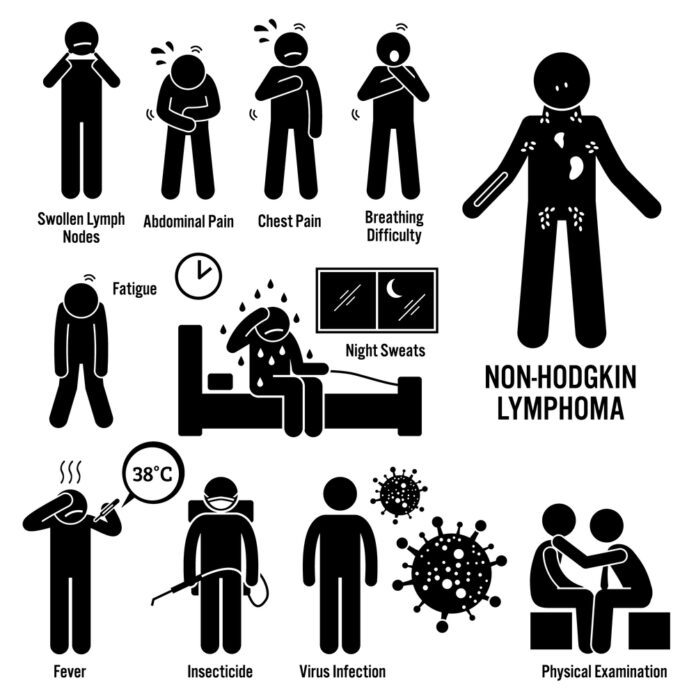Overview
Lymphoma – Non-Hodgkin is a type of cancer that generally develops in the lymph nodes and lymphatic tissue found in organs such as the stomach, intestines, or skin. In some cases, the NHL involves bone marrow and blood.
Non-Hodgkin lymphoma (NHL) is a cancer of the lymph tissue. Lymph tissue is found in the lymph nodes, spleen, and other organs of the immune system.
White blood cells, called lymphocytes, are found in lymph tissue. They help prevent infections. Most lymphomas start in a type of white blood cell called the B lymphocyte, or B cell.
● Isn’t just one disease–it’s a diverse group of blood cancers that all arise from lymphocytes (white blood cells that are part of the immune system).
● Lymphoma cells may develop in just one place or many sites in the body.
● NHL has many different subtypes that are either indolent (slow-growing) or aggressive (fast-growing).
There are 2 main types of lymphoma: Hodgkin lymphoma and non-Hodgkin lymphoma. Non-Hodgkin lymphoma (NHL) is a type of blood cancer that starts in the white blood cells known as lymphocytes. NHL develops in the lymphatic system, part of the immune system that carries lymph fluid throughout the body. Because the lymphatic system is so widespread, NHL can begin in many different places in the body.
NHL can potentially occur at any age. It is one of the more common cancers seen in children and teenagers.
What are the different types of non-Hodgkin lymphoma?
There are more than 60 types of NHL.4 NHL is definted by:
● Which type of lymphocyte they develop from (B cell or T cell)
● How the cells look under a microscope
● The chromosomal features of the cells
● The types of proteins found on the surface of the cells
● How slowly or quickly the cells replicate or grow1,2
About 90 percent of all NHL cases are B-cell lymphomas
About the lymphatic system
The lymphatic system is made up of lymph nodes connected by lymphatic vessels and organs throughout the body. The lymphatic system contains a type of white blood cell called a lymphocyte that is the key cell in the immune system to fight infection and lymphoma.
Other Key Organs of the Lymphatic System Include:
● Spleen: located in the left upper abdomen, under the rib cage.
● Thymus: located behind the breastbone and helps develop T-lymphocytes.
● Tonsils: located in the throat which helps trap bacteria entering through the mouth
Lymphoma may involve any part of the lymph system and even spread to other organs such as the lungs, liver, bone, and bone marrow.
Commonly Associated With
Lymphoma – non-Hodgkin; Lymphocytic lymphoma; Histiocytic lymphoma; Lymphoblastic lymphoma; Cancer – non-Hodgkin lymphoma; NHL
Cause
For most people, the cause of NHL is unknown. But lymphomas may develop in people with weakened immune systems, including people who have had an organ transplant or people with HIV infection.
NHL most often affects adults. Men develop NHL more often than women. Children can also develop some forms of NHL.
There are many types of NHL. One classification (grouping) is by how fast cancer spreads. Cancer may be low grade (slow-growing), intermediate grade, or high grade (fast-growing).
NHL is further grouped by how the cells look under the microscope, what type of white blood cell it originates from, and whether there are certain DNA changes in the tumor cells themselves.
Symptoms
Symptoms depend on what area of the body is affected by cancer and how fast the cancer is growing.
Symptoms may include:
- Drenching night sweats
- Fever and chills that come and go
- Itching
- Swollen lymph nodes in the neck, underarms, groin, or other areas
- Weight loss
- Coughing or shortness of breath if cancer affects the thymus gland or lymph nodes in the chest, putting pressure on the windpipe (trachea) or its branches
- Abdominal pain or swelling, leading to loss of appetite, constipation, nausea, and vomiting
- Headache, concentration problems, personality changes, or seizures if cancer affects the brain
Treatment
Treatment for non-Hodgkin lymphoma generally depends on the type and stage of cancer, as well as treatment goals. For example, some palliative treatments may be beneficial in helping patients prevent or treat non-Hodgkin lymphoma-related side effects, such as infections and low blood cell counts.
Treatments for non-Hodgkin lymphoma may include:
Chemotherapy
Chemotherapy may be prescribed to treat all types of non-Hodgkin lymphoma and to prevent the disease from recurring.
Radiation therapy may be used to treat non-Hodgkin lymphoma, and/or relieve pain and discomfort caused by an enlarged spleen or swollen lymph nodes.
Stem cell transplantation
A stem cell transplant, which infuses healthy blood-forming stem cells into the body, may be an option for some patients.
Targeted therapy
Targeted therapy drugs that use immune cells engineered in a laboratory to target lymphoma cells may be recommended.
A team of specialists will meet to discuss the best possible treatment for you. This is called a multidisciplinary team (MDT).
Other
Low-grade NHL often cannot be cured by chemotherapy alone. Low-grade NHL progresses slowly and may take many years before the disease gets worse or even requires treatment. The need for treatment is usually determined by symptoms, how fast the disease is progressing, and if blood counts are low.
Chemotherapy may cure many types of high-grade lymphomas. If cancer does not respond to chemotherapy, the disease can cause rapid death.
Possible Complications
NHL itself and its treatments can lead to health problems. These include:
• Autoimmune hemolytic anemia, a condition in which red blood cells are destroyed by the immune system
• Infection
• Side effects of chemotherapy drugs
Keep following up with a provider who knows about monitoring and preventing these complications.
Source
https://www.lls.org/lymphoma/non-hodgkin-lymphoma
https://blood-cancer.com/non-hodgkin-lymphoma/
https://news.cancerconnect.com/non-hodgkins-lymphoma/overview-of-non-hodgkins-lymphoma-SHQC7NtyXEis2TCi_bn0rg
https://www.cancercenter.com/cancer-types/non-hodgkin-lymphoma



